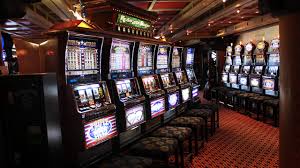
Slot machines are some of the most popular attractions in both land-based and online casinos. The allure of these brightly lit machines, their flashing lights, and the sound of spinning reels draws millions of players worldwide. But beyond their entertaining nature, there is a deeper psychological factor at play. One of the key elements that influence how players interact with slot machines is the concept of reward schedules. In this blog, we’ll take a look at how these reward schedules work and the psychological insights behind them, explaining why they are so effective in engaging players.
1. What Are Reward Schedules?
Reward schedules, also known as reinforcement schedules, are the patterns or intervals at which rewards (in this case, payouts) are given to players. These schedules are crucial in determining how often and in what manner a player will be rewarded for their actions. The psychological theory behind reward schedules is based on operant conditioning, a concept developed by renowned psychologist B.F. Skinner.
In simple terms, operant conditioning is the process by which behaviors are influenced by the consequences that follow them. If a behavior leads to a positive outcome (a reward), it’s more likely that the behavior will be repeated. On the other hand, if a behavior leads to a negative outcome (a punishment), it’s less likely to occur again. In the case of slot machines, the “behavior” is the act of pulling the lever (or pressing the button), and the reward is a payout or win.
2. The Role of Random Reinforcement
Most modern slot machines use a form of random reinforcement—where rewards are unpredictable and appear at random intervals. This unpredictability is key to the addictive nature of slots. Instead of a fixed schedule where players know exactly when they will win, slot machines use random reinforcement schedules. This means that the player can win at any given time, but there is no guaranteed pattern to the payouts.
One of the most powerful psychological aspects of random reinforcement is its ability to create anticipation. Players become highly engaged in the game, waiting eagerly for that next win. Even when they don’t win, the hope of a future payout keeps them playing.
3. Types of Reinforcement Schedules in Slot Machines
Slot machines typically use two main types of reinforcement schedules: fixed ratio schedules and variable ratio schedules.
- Fixed Ratio Schedules: In a fixed ratio schedule, players are rewarded after a set number of actions. For example, a slot machine might reward the player after every 10 spins. This type of reinforcement schedule is relatively predictable and leads to a higher level of response in the short term. However, players tend to lose interest quickly when they realize that they will only receive a reward after a set number of spins.
- Variable Ratio Schedules: This is the most common type of reward schedule used in slot machines. In a variable ratio schedule, the number of spins required to win is random and unpredictable. Players could win after the first spin, the tenth, or even the hundredth. This kind of schedule leads to a “gamblers’ fallacy,” where players believe that after a certain number of spins without a win, they are “due” for a payout, even though the outcome is still completely random. This uncertainty keeps players engaged, as the win could happen at any moment, heightening the excitement and anticipation.
4. The Psychology of Near Misses
Another psychological feature that many slot machines employ is the “near miss” effect. A near miss occurs when the reels stop just shy of a winning combination—players may see two out of three matching symbols, for example, or the third symbol may appear just off the payline. While a near miss isn’t a win, it feels similar enough to one that it creates the illusion of being “close” to a jackpot. This psychological phenomenon can trigger a feeling of hope and encourages the player to keep spinning, despite not actually winning.
Research has shown that near misses can trigger the same reward centers in the brain as a small win. This makes players feel as though they are almost there, making them more likely to continue playing in hopes of hitting the jackpot.
5. The Role of Variable Payouts in Gambling Addiction
The unpredictability of slot machines, combined with the use of variable ratio reinforcement schedules, is a key reason why slot machines are so addictive. The psychological theory of variable reinforcement explains that when rewards are not given consistently, players are motivated to continue because they do not know when the next win will come. This uncertainty keeps players engaged for longer periods of time and can lead to habitual or even compulsive gambling.
The brain’s reward system, particularly the dopamine pathways, plays a major role in this. Dopamine is the neurotransmitter responsible for feelings of pleasure and reward. When a player wins (or even experiences a near miss), dopamine is released, giving them a sense of satisfaction and reinforcing the behavior. Over time, the brain becomes conditioned to associate playing slots with dopamine rewards, creating a cycle of anticipation and play.
6. Why This Matters for Slot Players
Understanding how slot machines use reward schedules can help players make more informed decisions about their gaming behavior. If you understand that slot machines are designed to keep you engaged through random rewards and near misses, you can approach them with a more balanced mindset. Recognizing the psychological tricks at play can also help players avoid falling into the trap of chasing losses or continuing to play in hopes of hitting a big win that may never come.
It’s also important to note that self-awareness is key to responsible gambling. Players should set time limits, know their limits, and recognize when the game is no longer fun but is turning into a source of stress or anxiety. Responsible gambling tools, such as setting deposit limits or taking breaks, can help players maintain control.
7. Conclusion
Slot machines have been engineered not only to entertain but also to keep players hooked through sophisticated psychological techniques, especially the use of reward schedules. Understanding these psychological tactics—from random reinforcement to near misses—can empower players to approach slot games with a greater awareness of how their behaviors are being influenced. While these machines are designed to be exciting and engaging, players should always remember that gambling should be fun and controlled, rather than a path to addiction. By understanding how slot machines work psychologically, players can enjoy the game responsibly, without falling into the trap of excessive play.


